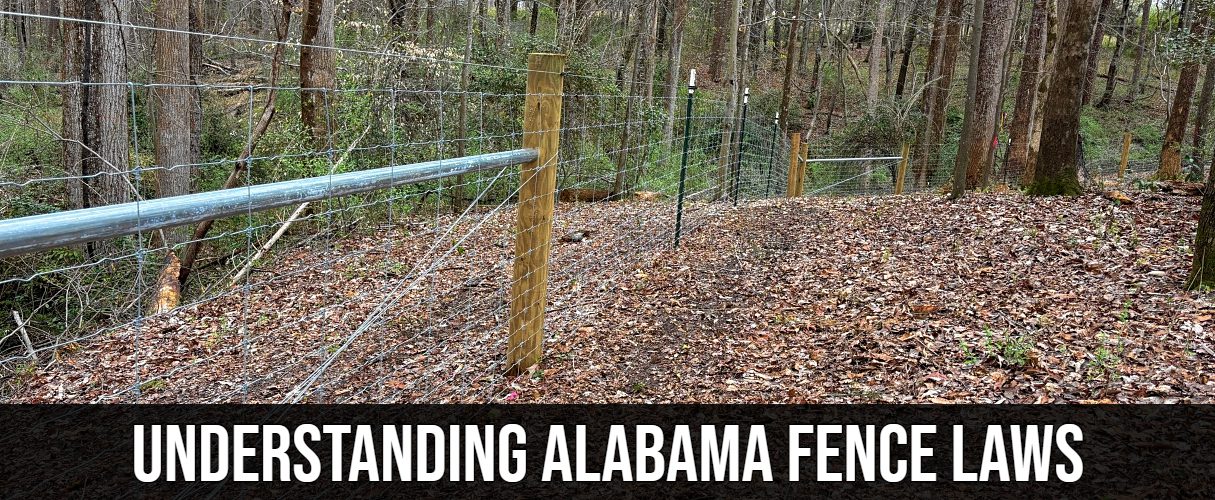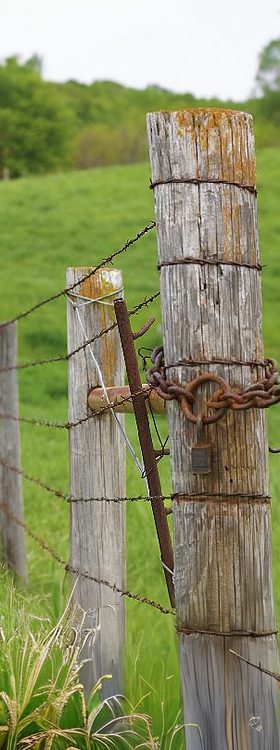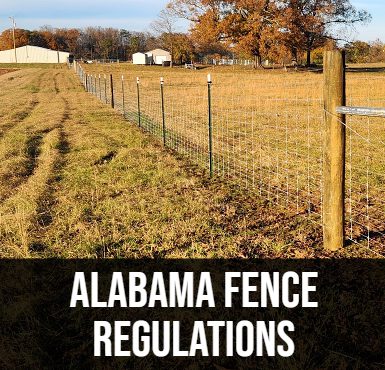
Overview of Alabama Fence Laws
Honestly speaking fences serve not as barriers but also to maintain harmony with our neighbors and prevent our pets from causing havoc in their gardens. Especially the rose ones! But in Alabama setting up a fence involves more than planting some posts; it’s crucial to be aware of the states laws regarding fences to avoid unnecessary conflicts and potentially uncomfortable social gatherings, like BBQ parties. Before you embark on building your version of the Great Wall in Alabama right in your backyard area lets take a closer look, at the regulations and guidelines concerning those quaint picket fences as outlined by the state authorities.

Understanding Alabama’s Fence Law Basics
The Foundation of Alabama Fence Laws
Alabama fence laws might not be the talk of the town, but they play a crucial role in keeping neighborly squabbles to a minimum. The state’s laws are clear: if you and your neighbor share a fence, you’re both responsible for its upkeep. Sounds fair, right? But here’s the kicker—this isn’t just a “you break it, you buy it” situation. Both parties are equally responsible for the costs, meaning that if you decide to go all out with a fancy, flexible fencing option, your neighbor might have to pony up half the bill (assuming they also enjoy the view, of course).
Sharing the Load: Joint Responsibility for Fences
Now, if you’re thinking about fencing in that prized tomato garden right on the property line, Alabama law sees this as a shared responsibility. So, make sure your neighbor is on board—or at least prepared to split the costs—before you start digging.
Who Owns the Fence on the Property Line?
The Ins & Outs of Joint Fence Ownership
Here’s where things get a little more interesting. In Alabama, if a fence sits directly on the property line, guess what? It’s considered jointly owned. That means your neighbor can’t tear it down without your permission, nor can you paint it purple without asking them first (even if purple is your favorite color).
Making Decisions Together: Maintenance & Modifications
This joint ownership also means both parties have a say in how the fence is maintained. So, if your neighbor decides to channel their inner landscaper and add some decorative elements, you’ve got the right to voice your opinion. After all, it’s half your fence too! At some point, it might be worth asking…. How do I sell Alabama land without a Realtor?
Responsibilities for Fence Maintenance & Repairs
Keeping the Fence in Shape: Who’s Responsible?
Remember that whole “joint ownership” thing? Well, it comes with its own set of responsibilities. If your side of the fence starts looking like it’s auditioning for a role in a haunted house, it’s on you to fix it up—unless your neighbor agrees to take on the task (good luck with that). In Alabama, the law is pretty straightforward: both parties are responsible for maintaining their portion of the fence.
What to Do When Your Neighbor Drops the Ball
If one neighbor neglects their side, the other can step in, make the repairs, and send the bill their way. So, keeping that fence in tip-top shape isn’t just about aesthetics; it’s about not getting stuck with the entire repair cost.
Specific Fence Regulations in Alabama
Understanding Height & Design Restrictions
Now, before you get too carried away with designing your dream fence, you need to know that Alabama has some rules about what you can and can’t do. For starters, you can’t just go ahead and build a 10-foot tall fence because you don’t like the way your neighbor looks at you during yard work. Most residential zones in Alabama limit fence heights to about 6 to 8 feet, depending on where the fence is located on your property. If you want something taller, you’ll need to apply for a variance—and probably have a good reason for it.
Navigating the Permit Process for Fences
And let’s not forget about the permit situation. Yes, even if you’re just replacing that old rickety fence with something more modern, you might need a permit. Skipping this step could land you with a fine and a stop-work order, which isn’t the best way to make friends with your local inspector. If you don’t want to deal with this entire process, it might be worth asking…. Would it just be faster and easier to sell my Alabama land?

How to Handle Property Line Disputes
When Property Lines Get Blurry
So, what happens when you and your neighbor can’t agree on where your property ends and theirs begins? Well, in Alabama, that’s when the fun really starts. If you find yourself in a boundary dispute, the best course of action is to hire a surveyor.
The Role of Surveyors in Resolving Disputes
A good surveyor will mark the property lines clearly, making sure there’s no question about where your land ends and your neighbor’s begins. And trust me, this is one expense you don’t want to skip—especially if your neighbor is as stubborn as an Alabama summer is hot.
Encroachment & Adverse Possession
The Danger of Fence Encroachments
Now, here’s a term that might make your ears perk up: adverse possession. Sounds a bit like a spell from Harry Potter, doesn’t it? But in reality, it’s a legal principle that can come into play if someone’s been using your land for long enough.
What You Need to Know About Adverse Possession
In Alabama, if a neighbor builds a fence that encroaches on your property and you do nothing about it for 20 years, they could actually claim that piece of land as their own. So, if you notice a fence sneaking its way into your yard, it’s time to speak up—or risk losing that land forever.
Special Considerations
Spite Fences & How to Deal with Them
Ah, the spite fence—a tall, unsightly structure designed to block your view or just generally annoy you. While Alabama doesn’t have a specific law against spite fences, many local ordinances do. If you suspect your neighbor is trying to build one, it’s time to check with your local authorities.
When Trees & Fences Collide
If you thought fences were the only things causing drama between neighbors, think again. Trees can be just as contentious, especially when branches start hanging over fences or, worse, falling on them. Alabama law allows property owners to trim branches that cross over into their yard—but only up to the property line.
Conclusion to Navigating Alabama’s Fence Laws
When it comes down to it‚ grasping Alabama’s regulations on fencing goes beyond abiding by the guidelines—it’s really about maintaining harmony and sidestepping avoidable disagreements with the folks next door‚ you know? Erecting a fence may appear simple at first glance‚ but lacking a firm understanding of the lawful framework could land you in a sticky situation that’s trickier to sort out than a heated round of Monopoly, with family.
If you’re thinking of putting up a fence in your yard or fixing up an existing one and are curious to learn more on what you’re entitled to legally speaking and how to maintain good relationships with your neighbors at the same time. Remember that knowledge is power! Not does a sturdy fence make for good neighbors but having an informed neighbor leads to even stronger connections between you all. Taking the time to familiarize yourself with these laws isn’t just safeguardin’ your property. It’s also an investment, in enhancing the well being of your local community.
When you’re considering where to put up a fence next time around keep in mind that it involves more than just materials and time off. It’s also crucial for maintaining relationships promoting mutual respect and preventing unpleasant conflicts over boundaries. Understanding the guidelines empowers you to handle scenarios, with assurance —whether its sharing repair expenses resolving boundary disagreements or determining paint choices. Your greatest asset is wisdom; armed with it you can construct more than a barrier. You can establish a strong base for fostering friendly relations, with your neighbors. Never forget, there’s always positives to selling your land in Alabama instead of dealing with all these fence laws.
Frequently Asked Questions (FAQs)

1. Who Is Responsible for the Maintenance and Repair of a Fence on the Property Line?
In Alabama, if a fence is situated directly on the property line, it is considered jointly owned by both property owners. This means that both neighbors share equal responsibility for maintaining and repairing the fence. If one neighbor fails to uphold their share of the maintenance, the other can make the necessary repairs and seek reimbursement.
2. Do I Need a Permit to Build or Replace a Fence in Alabama?
Yes, you generally need a permit to build or replace a fence in Alabama. Even if you’re simply replacing an existing fence with similar materials, many local authorities require a permit. Failing to obtain a permit can result in fines and a stop-work order, which could complicate future property transactions or renovations.
3. How High Can I Build a Fence in Alabama?
The height of fences in Alabama is regulated by local zoning laws. Typically, residential fences are limited to a height of 6 to 8 feet, depending on the fence’s location on the property. For front yards, the height limit is usually around 4 feet, while rear and side yard fences may go up to 6 or 8 feet. If you require a taller fence, you may need to apply for a variance.
4. What Should I Do if My Neighbor’s Fence Encroaches on My Property?
If you discover that your neighbor’s fence encroaches on your property, the best course of action is to discuss the issue with them directly. If you cannot reach an agreement, you may need to consult a surveyor to establish the correct property lines. If the encroachment is significant and unresolved, you might need to pursue legal action to protect your property rights.
5. Can I Trim Branches or Trees That Are Hanging Over My Fence From a Neighbor’s Property?
Alabama law allows you to trim branches or trees that overhang your property line, but only up to the property line itself. You cannot enter your neighbor’s property to perform the trimming without their permission. Any damage caused by improper trimming could result in liability, so it’s important to proceed with caution.